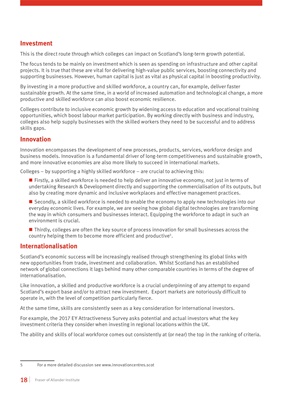
18 Fraser of Allander Institute
Investment
This is the direct route through which colleges can impact on Scotland's long-term growth potential.
The focus tends to be mainly on investment which is seen as spending on infrastructure and other capital
projects. It is true that these are vital for delivering high-value public services, boosting connectivity and
supporting businesses. However, human capital is just as vital as physical capital in boosting productivity.
By investing in a more productive and skilled workforce, a country can, for example, deliver faster
sustainable growth. At the same time, in a world of increased automation and technological change, a more
productive and skilled workforce can also boost economic resilience.
Colleges contribute to inclusive economic growth by widening access to education and vocational training
opportunities, which boost labour market participation. By working directly with business and industry,
colleges also help supply businesses with the skilled workers they need to be successful and to address
skills gaps.
Innovation
Innovation encompasses the development of new processes, products, services, workforce design and
business models. Innovation is a fundamental driver of long-term competitiveness and sustainable growth,
and more innovative economies are also more likely to succeed in international markets.
Colleges - by supporting a highly skilled workforce - are crucial to achieving this:
n Firstly, a skilled workforce is needed to help deliver an innovative economy, not just in terms of
undertaking Research & Development directly and supporting the commercialisation of its outputs, but
also by creating more dynamic and inclusive workplaces and effective management practices.
n Secondly, a skilled workforce is needed to enable the economy to apply new technologies into our
everyday economic lives. For example, we are seeing how global digital technologies are transforming
the way in which consumers and businesses interact. Equipping the workforce to adapt in such an
environment is crucial.
n Thirdly, colleges are often the key source of process innovation for small businesses across the
country helping them to become more efficient and productive5.
Internationalisation
Scotland's economic success will be increasingly realised through strengthening its global links with
new opportunities from trade, investment and collaboration. Whilst Scotland has an established
network of global connections it lags behind many other comparable countries in terms of the degree of
internationalisation.
Like innovation, a skilled and productive workforce is a crucial underpinning of any attempt to expand
Scotland's export base and/or to attract new investment. Export markets are notoriously difficult to
operate in, with the level of competition particularly fierce.
At the same time, skills are consistently seen as a key consideration for international investors.
For example, the 2017 EY Attractiveness Survey asks potential and actual investors what the key
investment criteria they consider when investing in regional locations within the UK.
The ability and skills of local workforce comes out consistently at (or near) the top in the ranking of criteria.
5 For a more detailed discussion see www.innovationcentres.scot